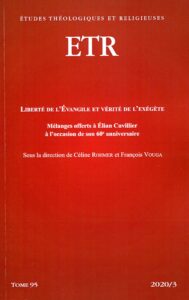En hommage à l’immense travail exégétique d’Élian Cuvillier, Dany Nocquet explore les résonances que peuvent avoir les expressions « liberté de l’Évangile » et « vérité de l’exégèse » dans la Bible hébraïque. La recherche vétérotestamentaire au cours des dernières décennies a mis en évidence de manière nouvelle un travail de réécritures et de réélaboration sur les questions du rapport d’Israël à Dieu, de la relation aux nations et à la terre. Dans ces domaines, la Bible hébraïque décrit les déplacements qui conduisent à une reconnaissance de l’accessibilité universelle à Yhwh, et de l’être au monde pluriel de Dieu. Ce faisant, l’Ancien Testament s’offre tel un apprentissage d’une liberté herméneutique audacieuse devant une vérité provisoire, sans cesse insaisissable et qu’il a fallu tenter de rendre intelligible au regard des circonstances multiples et des diversités croyantes de l’ancien Israël.
Mots-clés : Bible hébraïque, universalisme, inclusivisme, pluralisme religieux, yahwisme, Israël, Proche-Orient ancien, 2 Rois 5, Ésaïe 19.
Interpretative liberty and elusive truth : the teachings of the Hebrew Bible versus Yahwist diversity
As hommage to the enormous exegetic work of Élian Cuvillier, Dany Nocquet explores the echoes that the expressions “liberty of the Gospel” and “truth of the exegesis” may have in the Hebrew Bible. Old Testament research during the last decades has revealed in a new way rewriting and re-elaboration on the questions of the relationship of Israel to God, the relation to nations and to the land. In these fields, the Hebrew Bible describes the moves which lead to a recognition of the universal accessibility to Yhwh, and of the plural ways of being in the world of God. Thus, the Old Testament becomes a reference of an audacious hermeneutical liberty before a provisional truth, ceaselessly elusive, and that had to be made intelligible with regard to the multiple circumstances and the diversities of faith in Ancient Israel.
p. 501-514
Auteur
NOCQUET Dany
Dany NOCQUET est doyen de la Faculté de théologie de Montpellier, où il enseigne l’Ancien Testament et membre du Centre de recherches interdisciplinaires en sciences humaines et sociales (CRISES – EA 4424).
